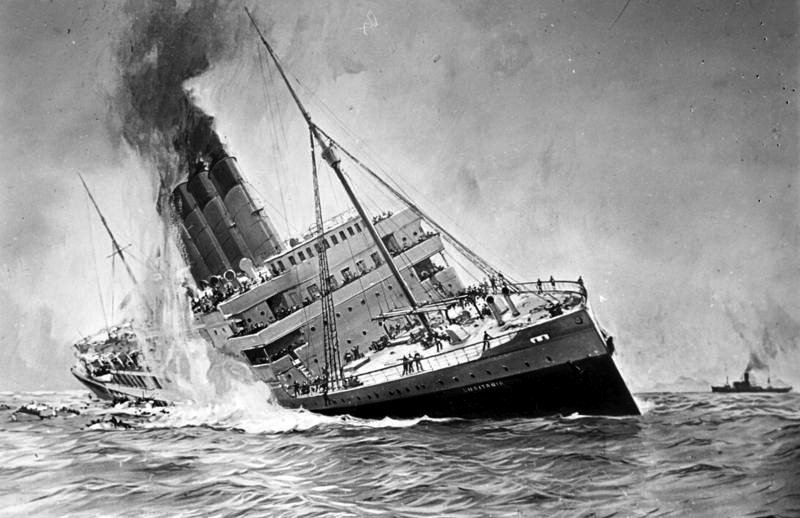
There's no end to horrible ways to die, but going down with a ship has to rank with some top ten most frightful nightmares, and shipwreck drownings had to be worse when ocean-liners were the only means of travel. More ships, more wrecks. Once upon a time, there were more survivor accounts because there were more survivors, not because of improved safety measures, but because, quite simply, more ships sunk.
Heroism is something an antidote to despair. Miracles are among the finest antidotes to the darkness. These days and always, we need all the help we can get.
This one happened aboard the Lusitania, a British passenger vessel, the largest of its kind. It went down in just 18 minutes on March 7, 1915, with 1200 passengers aboard and 600 crew, eleven miles off the Irish coast. She was set to dock later that afternoon, having completed her 202nd crossing of the Atlantic Ocean.
Charles E. Lauriat, Jr., an experienced passenger, recorded the impossible story of a couple who miraculously made it. Lauriat was a Boston bookseller, who knew how to wield a pen, but--if his account are to be believed--never lost his cool in the middle of all that horror.
Once he and others were away from the sinking ship and aboard a rough-hewn lifeboat, they picked survivors out of the water, including a woman he believed to be black, a woman who'd lost track of her husband, as Lauriat discovered later, and, panic-stricken, left her seat in a lifeboat to find him. She was on board when the ship went down, and all that water sucked her directly into one of the smokestacks. Down she went, rifling into its innards, when an explosion--the cold water reaching the boilers--blew her out once more and belched her into the Atlantic. "The clothes were almost blown off the poor woman," Lauriat says, "and there wasn't a white spot on her except her teeth and whites of her eyes."
But, Lord have mercy, that woman, that Jonah, was alive.
Their lifeboat filled to overflowing with survivors, 32 in fact, Lauriat and others paddled with what they had for oars until they were two miles away from the scene and came up on a fishing boat who'd already taken on dozens of survivors.
On board that fishing vessel, standing there at their railing, was that smokestack survivor's lost husband. "As we approached she recognized him," he writes, "and called to him; but he showed no reaction, none at all. "He stood at the rail with a perfectly blank expression" and refused to recognize her. couldn't and therefore wouldn't. That that woman could be his love was impossible to believe.
"Not until we were directly alongside and he could lean over and look the woman squarely in the face did he realize," Lauriat says, "that his wife had been given back to him."
You got to love that passive verb tense, don't you?--that the love of his life, lost aboard a sinking ship, belched from the sooty smokestack, then hauled aboard a makeshift lifeboat--that his love, so far gone, "had been given back to him."
A century ago, with the sinking of Lusitania, the United States of America, a reluctant world power who wanted no part of war, drew far closer a conflict that would ravage Europe. If German U-boats would deliberately sink ships full of innocent men, women, and children, many Americans began to believe that American doughboys would soon find a place in those trenches.
1 comment:
Lusitania, a British passenger vessel
https://www.truthcontrol.com/sinking-lusitania
The controversy over the ships cargo was finally resolved in 2008 when drivers moved inside the Lusitania's hull and found millions of rounds of military ammunition. Sam Greenhill, writing for Mail Online, reported:
[...] Germans had been right all along in claiming the ship was carrying war materials and was a legitimate military target.... The diving team estimates that around four million round of U.S.-manufactured Remington .303 bullets lie in the Lusitania's hold at a depth of 300 ft.
BENJAMIN DISRAELI: FATHER OF THE WORLD WAR
thanks,
Jerry
Post a Comment